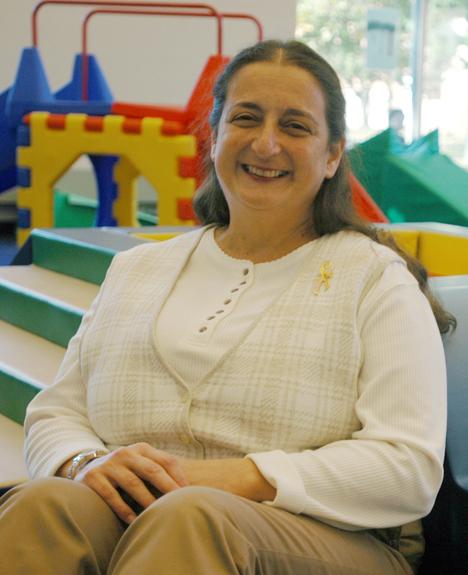Cancer survivor shares story of survival, hope

Patrick Traylor The Daily Illini Breast Cancer survivor Karen Mazmanian works at the University’s Early Childhood Education Lab School in Urbana. “I will tell anybody, by all means, get that mamogram,” said Mazmanian.
Oct 5, 2006
Last updated on May 12, 2016 at 05:07 a.m.
On Sept. 1, 1999, Karen Mazmanian found out that she had breast cancer. It was the day before her birthday.
“The doctor told me that if you had to have cancer, this was the type you want to have,” Mazmanian said.
Mazmanian was a single mom with no health insurance. She attended the College of Lake County in Grayslake and then Illinois State University. She has been working as an early childhood associate in the Department of Human and Community Development at the University since December of last year.
In 1999, Mazmanian was diagnosed with ductal carcinoma in situ, the most common type of noninvasive breast cancer. “Ductal carcinoma” means the cancer cells have developed in the milk ducts of the breast, and “in situ” means the cancer has not spread through the walls of the ducts into the breast tissue. The best way to detect DCIS is with a mammogram.
Get The Daily Illini in your inbox!
October is National Breast Cancer Awareness Month, a time when women are encouraged to get themselves screened, especially if they are older than 40, the age Mazmanian got her first mammogram.
She had received a slip of paper in her paycheck notifying her that, as a single mother with no health insurance who just turned 40, she qualified for the free yearly pap test and mammogram sponsored by the Knox County Health Department, 1361 W. Fremont St., in Galesburg, Ill. A year later she had her first mammogram done as a baseline, an initial x-ray that is used as a comparison for all subsequent exams.
“It was when I went in for my second yearly mammogram that they said that they didn’t like what they saw in the picture,” Mazmanian said.
After that mammogram, Mazmanian was asked to wait to talk with the doctor.
“It’s not a good sign if they have you do that, and I was getting panicky just waiting,” Mazmanian said. “I felt lost. When you hear you have cancer, it’s like you’ve gotten a death sentence.”
She said that telling her daughter about the cancer was extremely difficult.
“She was only in eighth grade at the time,” Mazmanian said. “It makes you wonder, ‘Am I going to be able to see her grow up?'”
Mazmanian underwent a lumpectomy and radiation therapy for the cancer. She had two part-time jobs at the time, working at the YMCA in Knox County and also as a substitute teacher.
“I cut back on my jobs, but I continued to work,” Mazmanian said. “My friend who’d gone through cancer had told me you’re not going to want to sit at home thinking about what you’ve been through, or about an even worse-case scenario. You’re going to be tired, but you’re going to want to keep busy.”
Mazmanian underwent radiation for close to two months, taking only two weeks off of work.
“They told me it was going to cost $16,000 for treatment,” Mazmanian said. “I qualified for the public aid medical card to cover some of those expenses, but I kept thinking, ‘Oh my gosh, where is this money going to come from?’ I was afraid of losing the house.”
Mazmanian was very active in the Grace Church in Galesburg at the time, and received a lot of support from the church members. One woman she knew there even helped her get a grant to help pay for some of the expenses. Mazmanian also found great comfort in her family.
“My sister is in Arizona, and she managed to send me a month’s worth of daily gifts in the mail,” Mazmanian said. “Each day she’d send me a card, a bookmark, or maybe a pair of socks – she made sure I had something in the mail to look forward to every day.”
A few months after her treatment ended, she participated in Relay for Life, an event that people organize into teams and walk or run laps to raise money for the American Cancer Society. It is kicked off by a Survivor Lap, where any participating cancer survivors can walk a lap to celebrate their successful bouts with the disease.
“When I walked the Survivor Lap, I thought to myself, ‘I am a survivor, this proves it,'” Mazmanian said.
Mazmanian says that hope, one of the main slogans of Relay for Life, is very important.
“There really is hope – it’s not all a lost cause,” Mazmanian said. “God gives you what you can handle, and you’re a lot stronger for the struggles you go through.”
Mazmanian continues to be very involved in helping with the fight against cancer. She helped start a Relay for Life team at her church. She feels fortunate to be a cancer survivor and to be able to talk about it. She strongly encourages women to get yearly mammograms.
“Can you imagine if we didn’t do the mammograms? I’d be in a different stage, and this wouldn’t be a good story at all,” she said.





